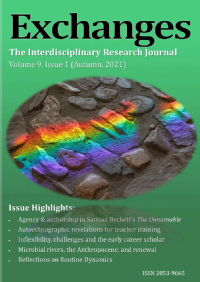2021 – A Journal’s Year In Review
Writing about web page https://exchanges.warwick.ac.uk/
Dr Gareth J Johnson, Managing Editor in Chief of Exchanges, reflects back on busy, eventful and successful year for the journal – while glimpsing ahead at the next twelve months.
When I served on various student societies and was partly responsible for writing their annual reports, we had a phrase myself and my best friend Simon used to use as the opening line: ‘Well, it’s been a year and what a year it’s been’. Today, this feels like a phrasing which is more than a little apposite when reflecting on the experience of running the Exchanges journal throughout the last twelve months. 2021 certainly has been quite a year.
It’s been a year when like so many others, we’ve continued to work under the most challenge work-a-day experiences of my working lifetime true enough. But it has also been a time for some considerable growth and expansion of our activities. During 2021 for example we produced four issues of the journal, from the Cli-Fi Special (Vol 8.2) back in February through to our regular autumn volume in October (Vol 9.1). Given Exchanges is resourced to produced two issues annually, doubling our output has required some not inconsiderable effort on my part to keep all the additional plates spinning in the air. Producing these issues has too required the ongoing contributions from my Editorial Board and wonderful associate editors who joined us to help produce one or more specific special issues. My thanks to each and every one of them!
This year we’ve also produced another thirteen episodes of The Exchanges Discourse podcast. There would have been more, but I found that my time was being used more often on the journal itself this year, so this side-project wasn’t perhaps given quite as full a flowering in 2021 as I might have liked. That said, in recent weeks we’ve had two new episodes launched, two others recorded and three more already scheduled for recording in 2022. So, it is safe to say, season three of the podcast has got plenty of content already lined up. You can of course catch the most recent episodes here:
- Looking Back at Volumes 8.4 and 9.1 of Exchanges
- A Conversation about Educational Podcasting with Jim Judges
Naturally though, my and the editorial team’s core focus remains on the journal. Behind the scenes we’re working towards three additional special issues which I hope will all reach fruition and publication in 2022. Special issues continue to be an exciting area of development for the title, and throughout this year I’ve also been regularly enjoying outline discussions about possible additional special issue projects. I can’t say too much right now as beyond the three scheduled volumes we’ve not (formally) agreed to take any others forward as of yet. Despite that caveat I can admit to having a number of meetings in 2022 pencilled in to change the status of some of these from possibilities to ongoing concerns.
Over and above all this publication and podcasting activity, have been the workshops and outreach sessions I’ve participated in, hosted or chaired. Some of these have been as part of our very own wonderful IAS Accolade Programme for early career researchers. Some of these though have been specifically allied to special issues: with both the Lonely Nerds two-day conference and the two Anthropocene academic writing workshops in September and November being particular standout highlights.
All this, plus the administrative and managerial overheads of running the journal…and all with only a modest amount of staff resource too! It’s been a great success, and while there have been bumps and learning moments along the way, if 2022 is anything like 2021, I think Exchanges can look forward to going from strength to strength in the new year.
So, at the close of this year, at least for me as I depart for a well-earned Christmas vacation, I’m raising a virtual glass to every author, reviewer, editor, workshop delegate and special issue lead I’ve crossed paths with this year. Not to mention all the staff at the IAS itself! You’ve helped make 2021, despite the ongoing pandemic and other crises human-made or otherwise, what it was for Exchanges: a great year. And hence, have my eternal thanks!
Looking to the future, well 2022 sees the beginning of our run up to our tenth anniversary issue with the journal numbering finally hits double figures in the autumn. What do we have planned to commemorate this august moment in October? Well, keep reading this blog, listening to the podcast, accessing the journal – or just talk to me – to find out for sure! Exciting times for me, the journal and all our contributing audiences too I would hope.
In the meanwhile, see you all for an exciting and hopefully less externally eventful 2022!
 Gareth Johnson
Gareth Johnson

 Please wait - comments are loading
Please wait - comments are loading



 Loading…
Loading…

